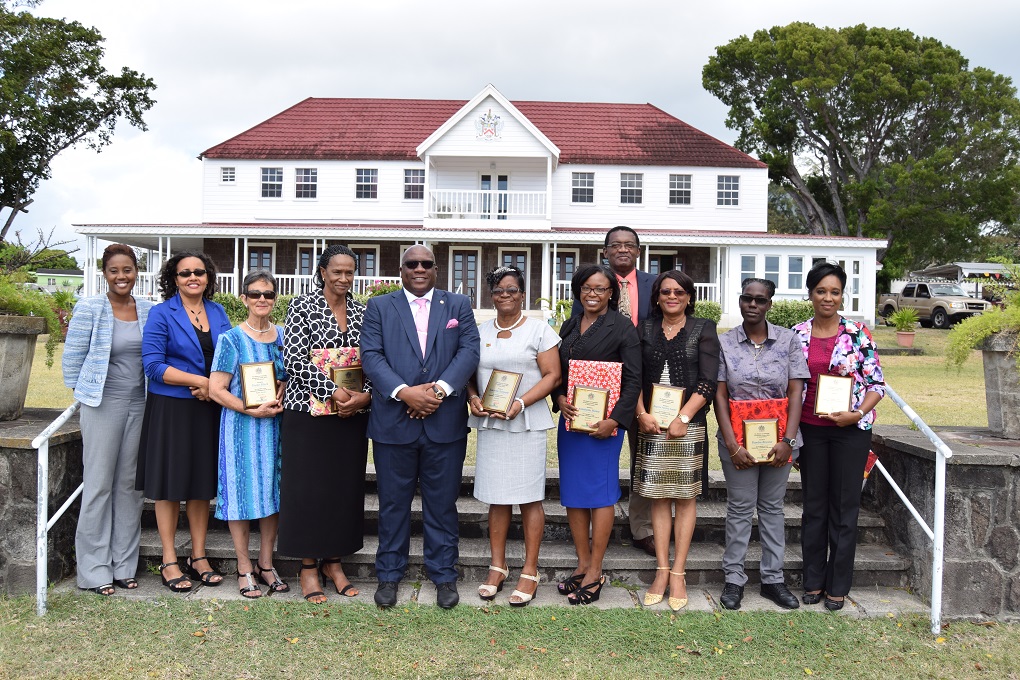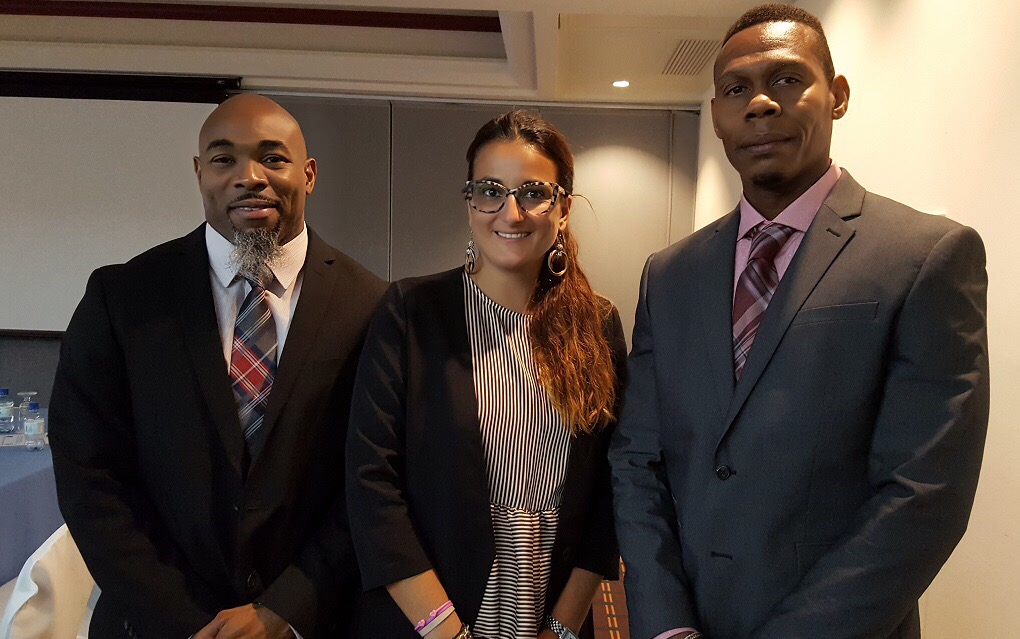Photo (L-R): Senator Hon. Akilah Byron-Nisbett; Senator and Minister of State Hon. Wendy Phipps; Mrs. Yvette Slack; Shirley Julius; Prime Minister Dr. the Hon. Timothy Harris; Lucrecia Sargeant; Antoinette Henry; Beula Mills; Tiandra Browne; Michele de la Coudray-Blake; Back Row (Hon. Eugene Hamilton)
Basseterre, St. Kitts, March 8, 2017 (SKNIS): The Ministry of Community Development, Gender Affairs and Social Services joined the international community on March 8, 2017, in the celebration of International Women’s Day under the theme “Be Bold for Change” with an annual awards ceremony held under the distinguished patronage of His Excellency the Governor General Sir Tapley Seaton at Government House.
Eight pioneering women were celebrated for their stellar contributions to nation building in the fields of Tourism (Transportation), Nurturing, Public Service, Construction, Athletics, Entrepreneurship, Counselling, Volunteerism and Gerontology.
The awardees were Shirley Julius (Pubic Service), Tiandra Browne (Construction), Michele de la Coudray-Blake (Counselling), Yvette Slack (Nurturing), Antoinette Henry (Athletics), Lucrecia Sargeant (Entrepreneurship), Dr Patricia Richards-Leader (Gerontology) and Beula Mills (Tourism/Transportation).
Director of Gender Affairs, Celia Christopher, giving an address during the awards ceremony noted that this year’s theme for the commemoration of International Women’s Day is quite significant.
“The United Nation theme for 2017 is ‘Women in the Changing World of Work- Planet 50-50.’ The theme is very timely as the empowerment of women is one of the Millennium Development Goals which is critical to the realization of the other goals. There is also the campaign “Be Bold for Change.” What does “Be Bold for Change” really mean? It is simply a rallying cry for women to fight for equality in their communities, work places, since we can all be leaders within our own spaces of influence by taking bold pragmatic action through collaboration.”
Mrs Christopher added that “To be bold for change also means that we can support women’s education; we can help women advance and unleash the limitless potential offer to economies throughout the world or we can help to stop gender based violence.”
Challenging women to support other women, Minister of State in the Ministry of Gender Affair, the Honourable Wendy Phipps also encouraged women to “step out in faith and with courage in spite of what the people around you say,” adding that “to me it matters more what is in you than what is around you.”
Senator Phipps warned that while “we have achieved much over the last hundred years or so since we began celebrating International Woman’s Day in various forms— we can point to the pursuit of education; we can also point to the decent work achievement for women within the global market place; we can also look at women in leadership, whether academia, politics, science and technology or any other area of human endeavour,” there is still much to be achieved considering “the United Nations target year by which time we should achieve gender parity.”
Senator, the Honourable Akilah Byron-Nisbett, Deputy Speaker in the National Assembly, during the keynote address reminded all that “Throughout history we have proven that, despite the stereotypes being forced upon us, we have in fact been capable of being Bold for Change. For an example of this, we can look at the celebration of this day, International Women’s Day, and there we will find the Suffragettes who in the early 1900’s forged purposeful action for equality. The Suffragettes are credited for having started International Women’s Day with the first officially named event held in 1911. It was the bold action of this group of women that gave women around the world that voice which became the right of women to vote. These women were willing to take bold and decisive measures, measures unheard of at this time in history in order to see women taking part in the democratic process and having the right to vote. These women were Bold for Change.”
She highlighted examples of pioneering women in the Caribbean “such as Dame Eugenia Charles and Kamla Persaud-Bissessar rise to lead their countries as prime ministers” and others as some of the women who “have had to be bold in order to effect meaningful change.”
-30-









